History and achievements
Since opening our doors in 1977, Redfern Legal Centre has achieved justice for thousands of people each year.
RLC has consistently championed access to justice for all members of the community. This mission has taken many forms, from providing general advice and casework, to informing and educating the wider public on their legal rights, to providing submissions to Parliament and international bodies such as the UN.
RLC has fought high profile cases to protect the civil rights of LGBTI activists and launched class actions on behalf of exploited tenants. At other times, our greatest accomplishments have been in what we have achieved for individuals, whether that be assisting a victim of domestic violence to find secure accommodation or helping a vulnerable person manage oppressive debt. These seemingly small successes can have a transformative impact on the lives of our clients.
Since its inception in 1977, RLC has initiated or been actively involved in projects which have led to the establishment of: Welfare Rights Centre, Prisoners Legal Service, Accommodation Rights Service, Consumer Credit Legal Centre, Campbelltown Legal Service, Redfern Legal Centre Publishing and Streetwize Comics.
Here is just a brief snapshot of RLC’s successes over the last four-and-half decades…
1977 – RLC established
Redfern Legal Centre opened its doors on a non-existent budget and a dream to give people experiencing disadvantage access to the law.
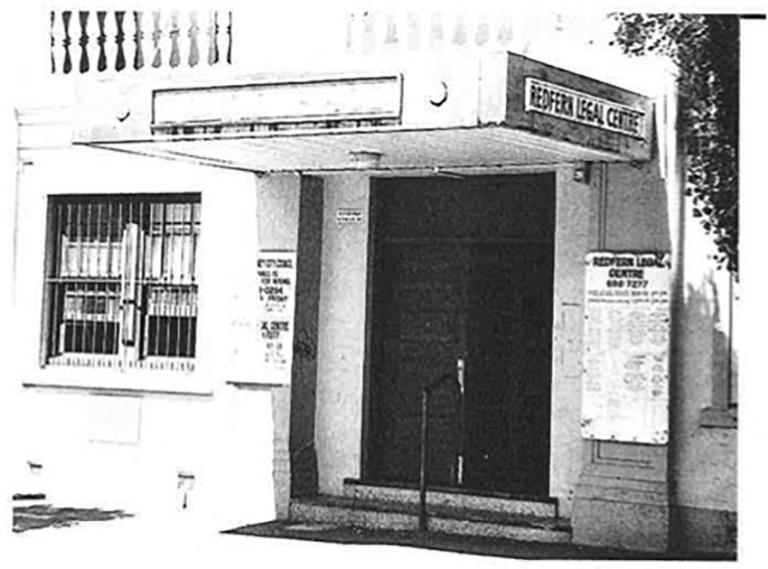
1978 – Providing representation for Mardi Gras participants
One of RLC’s earliest accomplishments was fighting for the civil liberties of 53 people arrested during the inaugural Mardi Gras parade. RLC has continued to support LGBTI activists and worked tirelessly in efforts to reduce police misconduct against this community.
1985 – RLC’s defence of prisoners at Long Bay Prison
RLC opened over 920 action files and defended over 220 matters for the prisoners at Long Bay Prison.
1986 – Establishment of the IDRS
Through the efforts of RLC volunteers, the Intellectual Disability Rights Service was established in February 1986 with core funding of $60,000 from the NSW Department of Youth and Community Services. The aim of the IDRS is to ensure that people with intellectual disabilities have a greater opportunity to exercise their rights. In its first year, the IDRS gave over 900 advices, continuing work with 80 of these cases. In 1986, IDRS also wrote, published and sold over 2500 copies of Legal Rights and Intellectual Disability – a short guide, a lay person’s guide to relevant law.
1986 – Publication of the Debt Survival Guide
The Debt Survival guide is a joint production by RLC and the Consumer Credit Legal Centre, with partial funding by the Law Foundation of NSW. This book is a comprehensive guide to credit and debt law for financial counsellors, community workers, lawyers and consumers.
1987-88 – Assistance with applications for compensation from the Victims Compensation Tribunal
RLC assisted clients with applications for compensation from the Victims Compensation Tribunal which was created in February 1988. Initially, the work included applications for compensation as a result of street assault and sexual assault. Over the following years, the primary focus of the RLC victims of crime work rested with adult and child sexual assault and domestic violence. RLC developed an expertise in this area and together with the case work, conducted seminars and information sessions and lobbied for an improvement in the services for victims of crime.
1988-9 – Development of WDVCAS
RLC established the concept and developed the Women’s Domestic Violence Court Assistance Scheme at Redfern in conjunction with South Sydney Domestic Violence Committee. It was a joint initiative of community workers in the South Sydney area and solicitors from community legal centres. The scheme attempted to ensure women were provided with adequate protection by the legal process. Since 1988, the schemes have been extended throughout NSW based on the Redfern model. Not only has the RLC's establishment of the WDVCAS allowed assistance to be provided to hundreds of women in domestic violence, RLC continues to contribute to public debates on perpetrators programs and legislative amendments in this area of the law.
1989 – Representation of the Family of David Gundy at a Coronial Inquest
Mr. David Gundy was an Indigenous Man who was killed in his own bedroom in April 1989 during a police raid, despite not being wanted by police for any offence. RLC acted for the brothers and sisters of Mr. Gundy as government funding for representation at the inquest was refused. RLC has had a long history of advocating police accountability since its inception, and continues to do so today as the only NSW Community Legal Centre with a Police Powers practice area.
Parliamentary recognition of RLC’s social justice efforts
Since its establishment, RLC has been recognized by Parliament as a highly effective, innovative and influential organisation:
- Just two years after RLC’s establishment in 1977, the then Attorney-General, Mr. Walker, praised the ‘determined efforts’ of RLC ‘to provide supplementary and diversified legal aid’ and their discovery of ‘new ways to achieve the things that need to be achieved in legal aid’.
- A little over ten years later in 1989, RLC’s influence was already apparent as The Hon. J.W. Shaw commended RLC as having ‘an outstanding reputation in educating consumers about the law’.
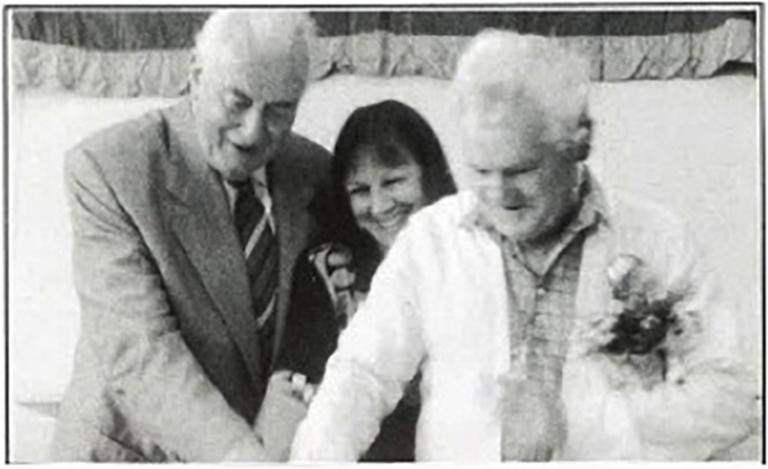
cut the cake at RLC’s 15th birthday in March 1992.
1990-91 – Reduction of prison terms for over 1,500 NSW prisoners
In Bates v The State of New South Wales in the Supreme Court and The State of New South Wales v Bates in the Court of Appeal, RLC successfully represented a prisoner in a test case on the correct calculation of remissions. The decision was responsible for the reduction of prison terms for 1,670 prisoners in New South Wales.
1991-2 – Test cases against the Department of Housing
RLC ran the first of a number of test cases against the Department of Housing. This first matter was settled on terms favourable to our client. The issue was eventually litigated in Nicholson v NSW Land and Housing Corporation, Stoddard J held that the Department of Housing could not evict a tenant without grounds as the principles of natural justice applied to prevent the Department depriving tenants of the right to a fair hearing.
1993-5 – Successful case against the State bank affecting over 300,000 NSW borrowers
RLC initiated legal action against the State Bank of NSW in order to deal with a vast array of breaches of the Credit Act by the bank. The breaches affected over 300,000 borrowers in NSW and ranged in severity from breaches of the Act caused by the Bank’s involvement in timeshare lending schemes to instances of the Bank illegally collecting millions of dollars in revenue from borrowers. The Commercial Tribunal determined that the Bank would be required to pay $5 million into the Financial Counselling Trust Fund as a penalty for its breaches of the Credit Act.
The case amounted to the most comprehensive investigation of a major Bank’s personal lending practices yet carried out in Australia. The penalty was the largest yet in the history of consumer credit matters in Australia. On the basis of this case, other credit providers admitted they too had breached provisions of the consumer protection legislation. RLC’s successful involvement in cases such as this one, forced many of the major banks to realise the importance of their duties to borrowers and the need to implement comprehensive staff training and borrower-information procedures.
1994 – Drug Law Reform Project
Redfern Legal Centre’s Drug Law Reform Project began in 1994. The work of the project has been groundbreaking in its international significance. RLC recognised the failures of prohibition – most notably the corruption arising from the existence of the black market and the negative impact on individuals and the legal system. As an alternative to prohibition, RLC developed a harm reduction model for controlled availability of drugs. Although the work was controversial, it was well received in health, legal and community fields.
1996 – RLC awarded for dedication to prevention of domestic violence
RLC received a Special Award for dedication and commitment to prevention of domestic violence from the NSW Minister for Community Services, Ron Dyer, MLC. The award was made on National Stop Violence Against Women Day 1996, and presented to the Redfern Domestic Violence Court Assistance Scheme. In establishing the scheme, RLC pioneered a holistic approach to the provision of services for women seeking legal protection from domestic violence. The Redfern Scheme integrated the provision of legal and social welfare services. It was acknowledged that the legal protection from domestic violence was more accessible if women received simultaneous assistance with other issues associated with the violence.
Case Study: Employment law in 1995-6
1. RLC acted for a part-time contract cleaner who had been unfairly dismissed after she had suffered a back injury. The respondent argued against her application proceeding as it was lodged out of time. RLC successfully defended this argument and the respondent then made a reasonable offer of settlement.
2. The Centre also:
a. Advised a young apprentice about his rates of pay;
b. Assisted another young man from a non-English speaking background obtain his leave entitlements on resigning and,
c. Acted for a factory worker from a non-English speaking background who was dismissed, after being employed for 16 years, because the employer alleged she was not following instructions.
1997 – The birth of Rentwatchers
RLC founded the group “Rentwatchers”. Rentwatchers is a broad based coalition involving Shelter, Tenants Union, TAAP services, Local Councils, Social Change media, private tenants and other groups. Rentwatchers were campaigning against unfair rent increases and evictions in the lead up to the Sydney 2000 Olympics.
1997 – Launch of Tenant’s Guide to fighting rent increases
In June 1997, RLC’s Tenants Service launched Going thru the Roof: a tenant’s guide to fighting rent increases in the Residential Tenancies Tribunal. Rising rents in the inner city are of great concern to many tenants who contact our Centre. Since rental laws in NSW are extremely complex, RLC decided to produce some information not fully explored in other education projects i.e. applications by tenants with respect to rent. The project had three main aims; to encourage tenant participation in Residential Tenancies Tribunal hearings, to explain the law relating to rent in plain English to enable tenants to gauge whether they have a case for an “excessive rent” application at the Tribunal and to encourage tenants to have an understanding of tenancy law reform issues relating to rent.
1999 – ‘Hit the dirt’ Project
The Credit and Debt team at RLC, aware of limited legal services available in rural NSW, decided to run a program of legal workshops and legal advice in such areas. The aims of the project were to; provide community legal education and training on credit and debt matters to financial counsellors and community workers in rural NSW, provide advice in credit and debt matters to rural consumers, and identify credit and debt issues of concern to rural consumers.
A two week tour of the Riverina district of south-western NSW was organised. Extensive publicity was undertaken, and two credit and debt solicitors set out with a bundle of information and resources. Legal workshops and face-to-face advice sessions were provided in Wagga Wagga, West Wyalong and Griffith. During the two week period, 18 workshops were presented and four days of face-to-face advice sessions were provided.
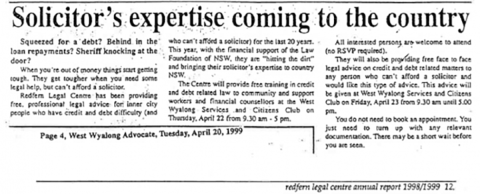
2000 – Assistance for tenancy clients affected by the Olympic Games
One of the unseen consequences of the 2000 Olympic Games was the effect it had on vulnerable tenants, with increased rent prices and evictions. RLC’s Tenancy Advice Team were able to assist many of these clients and advocate for their rights to secure and affordable housing.
Case Study: Discrimination in 2001-02
RLC represented an Aboriginal woman in a racial vilification claim. The client worked as a foster carer for Aboriginal children. The racial vilification and violence from her neighbour was damaging for herself and the children she cared for. The matter went through HREOC and proceedings were commenced in the Federal Magistrates Court. At that stage, mediation was conducted. The respondent offered an apology without admissions to the client and he undertook to attend cross-cultural training. In addition, an order was made by the court that he was not to repeat the behaviour.
RLC also acted for a man who was denied a stablehand’s licence due to his criminal history. RLC assisted him in lodging a complaint to the HREOC. The client had convictions which were more than 10 years old and which he had not been required to disclose to the NSW Thoroughbred Racing Board. Nor were the convictions relevant to his work as a stablehand. The Commission decided that discrimination had occurred and made a recommendation for compensation of over $33,000, as well as recommending a review of the Thoroughbred Racing Board’s use of criminal records in licensing matters.
2002 – Presentation of almost 50 community legal sessions
In 2002, RLC presented approximately 48 community legal sessions on a range of topics including; human rights in action, understanding residents rights in town planning, credit and debt matters for Aboriginal communities, ‘don’t get caught red-handed’: criminal law local court processes, domestic violence, tenancy and law for welfare workers. RLC produced fact sheets and brochures which provided the legal information in an accessible way.
2004 – Successful advocacy on behalf of the CAROBS campaign
In 1994, RLC became involved with a local community campaign Coalition Against the Removal of Banking Services (“CAROBS”) that was concerned about the withdrawal of bank branches in the area. RLC assisted the campaign to consult with the banks, and, when these negotiations were unsuccessful, worked with the Sydney Credit Union to advocate establishing a new branch in the area. Through the combined efforts of RLC and the campaign, Sydney Credit Union established a new branch in the area, providing valuable services to the local community.
2005 – Legal Aid in Aceh
RLC conducted a major fundraiser in September 2005 to support the reconstruction of the legal aid office in Aceh which had been demolished by the Tsunami. The money raised was used to secure rental accommodation for Legal Aid Banda Aceh for their offices for six months.
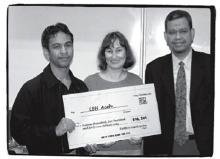
Mr. Hendra Budian, a human rights activist, in Australia in December 2005,
accept the ‘big cheque’ on behalf of LBH (Legal Aid) Aceh.
2006 – Resource materials on compensation for victims of domestic violence
RLC drafted resource materials for use by advocates to assist the accessibility of the Victims Compensation Scheme to Aboriginal victims of domestic violence. The aim is to achieve a more sympathetic response from the Victims Compensation Scheme to applications that address their needs.
Case study: Credit and Debt Legal Service 2006-7
A number of associated photographic studios presented dodgy prizes (namely second prize) as a means of luring naïve young girls and pressuring them to enter into onerous contracts to purchase photo portfolios at exorbitant prices. RLC was successful in negotiating the release of our clients from their contracts and a full refund of all monies paid.
2008 – Establishment of Sydney University Postgraduate Representative Association (SUPRA)
Since late February 2008, Redfern Legal Centre has operated a branch office at SUPRA. This office provides free, confidential legal information, advice and advocacy to postgraduate students from any of Sydney University’s campuses including the affiliated campuses of the Sydney College of the Arts, The Conservatorium of Music, Orange Agricultural College and Camden Farms.
2008 – Establishment of TAFE (Sydney Institute) Legal Service
Since 2008, the Legal Service at the Sydney Institute of TAFE is provided by RLC and operates in Ultimo as a branch office of the Centre. This is the only Legal Service based at a TAFE College in Australia and provides free, confidential legal information, advice and advocacy to students who are members of the Student Association and eligible TAFE staff at the eight colleges of Sydney Institute of TAFE.
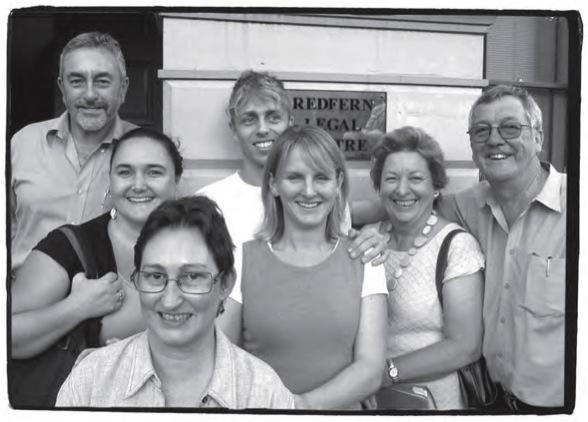
RLC represented a number of Aboriginal and Torres Strait Islander clients seeking compensation for their removal from their homes and the subsequent abuse they endured in institutional care. Through our advocacy and partnership with Corrs Chambers Westgarth, a number of clients were able to secure finalised payments.
2009 –18 Sydney Women’s Domestic Violence Assistance Scheme based at RLC
From 2009 to 2018, RLC became home to the Sydney WDVCAS, a program which provides support to women who have been victims of domestic and family violence at the Balmain, Waverly and Downing Centre Courts.
In 2018, the RLC board made the difficult decision to not extend our contract to auspice the Sydney Women’s Domestic Violence Court Advocacy Service (Sydney WDVCAS). Sydney WDVCAS had experienced a significant increase in demand, and required the expertise of a service provider who could oversee the provision of non-legal court support, counselling, and other vital services essential to supporting victims of domestic violence.
RLC pioneered frontline domestic violence legal services for more than 30 years and we are immensely proud of the work that was achieved by Sydney WDVCAS whilst under the auspice of our Centre. The dedication of staff in this service to women and children experiencing extreme circumstances has been extraordinary. We were pleased to see this service continue under the auspice of another trusted provider from 2018, with many of the same staff.
Redfern Legal Centre is a specialist in the provision of legal services for women and children in domestic violence situations and continues to provide support, in particular for women experiencing financial abuse through the establishment of NSW's first free statewide financial abuse service in 2018 (see further below).
2010-12 – Drafting the Shadow Report to the United Nations on Australia’s implementation of CRPD
RLC was one of the lead agencies involved in drafting this report on Australia’s implementation of the Convention on the Rights of Persons with Disabilities (‘CRPD’). The shadow report made recommendations to the United Nations Committee on the Rights of Persons with Disabilities. These recommendations provided the basis for the UN recommendations to the Australian Government regarding Australia’s implementation of the Articles of the Convention.
Case Study: Discrimination and Human Rights in 2010-11
1. RLC represented an overseas student in a race discrimination complaint against an accommodation provider that settled before the hearing in the Administrative Decisions Tribunal.
2. RLC also assisted clients to prepare discrimination complaints to the NSW Anti-Discrimination Board and the Australian Human Rights Commission and represented them at conciliation conference. These discrimination cases included:
a. Acting for a parent in a complaint against a school on behalf of her son who has multiple disabilities
b. A disability discrimination complaint by a post graduate student against a university
c. A complaint on the grounds of age and disability against a local council about obstructed access to the narrow street where the client lives.
2011 – ISTAAS launch of The Boarders and Lodgers Legal Information Kit
Boarders and Lodgers are amongst the most vulnerable of renters and are in desperate need of legal protection. In August 2011, RLC’s ISTAAS launched the kit to assist this vulnerable group. The kit was distributed to all public libraries, as well as to all Corrective Services libraries. A revised and updated version of the kit entitled Boarding Houses and the Law, was published by RLC in 2020.
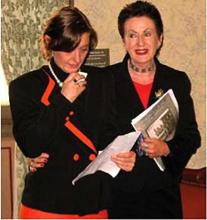
Sarah Bell at the launch of The Boarders and Lodgers
Legal Action Kit (2011).
2011 – Establishment of a state-wide international student service
Due to language difficulties or a lack of knowledge about local laws, international students are highly vulnerable to exploitation and scams, both in employment and housing arrangements. Through this service, which is unique in NSW, RLC provides generalist legal advice to assist these students.
Case study: International Student Accommodation Scam
In 2011, RLC assisted an international student from China to make an application to the General Division of the CTTT to recover a bond he had paid to a home owner. Among other things, the homeowner had misled the student into believing that the terms of his accommodation were vastly different to what they were in reality. The case was settled at conciliation prior to the CTTT hearing and the homeowner agreed to return the bond.
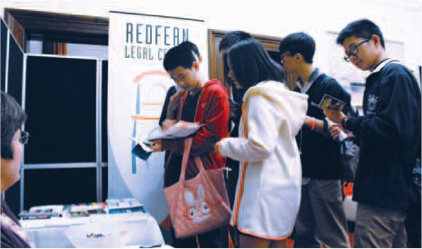
International Student Workshop (2011).
2012 – Establishment of a statewide service in both police powers and administrative law
This service forges relationships with lawyers and community workers across the state, seeking to provide advice and assistance to clients and advocates.
Case study: Police Confiscate mobile phone
In 2012, RLC assisted a young man who had his phone confiscated by police after filming an altercation between the police and a teenage girl on the street. RLC drafted a letter to the police outlining his right under the Legal Enforcement (Powers and Responsibilities) Act 2002 to have his property returned. After the letter was sent, police immediately returned the mobile phone to the client.
2012 – ISTAAS launch of the Share Housing Survival Guide
This guide addresses legal and non-legal issues that come up when living in a share house and was funded by NSW Fair Trading. The guide ultimately helps tenants living in share housing navigate their way through various legal complexities. This guide is available online at:http://www.sharehousing.org
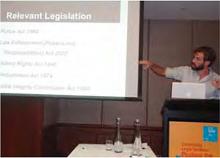
addressing the 2012 NSW Community Legal Centre Conference
on making a police complaint.
2013 – Establishment of the Unfair Dismissal and General Protections Advocacy Scheme
Through RLC’s partnership with Clayton Utz, this scheme was set up in order to provide advice and advocacy to people bringing general protections claims to the Fair Work Commission. This scheme helps to ensure clients are protected from unfair dismissal, thereby enhancing their financial independence and reducing their vulnerability.
Parliamentary recognition of RLC’s social justice efforts
In 2013, the then Attorney-General, Mr. Mark Dreyfus, acclaimed RLC as ‘invaluable…in the delivery of legal and financial counselling services to the community [and in] ensuring that all Australians have access to justice’.
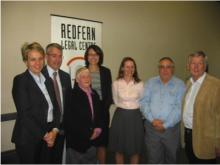
2013-14 – Development of Prosecutor Hearing Clinics
Sydney WDVCAS, based at RLC, partnered with police prosecutors to develop monthly pre-hearing clinics at the Downing Centre and Waverly Local Court. These clinics give victims of family and domestic violence the opportunity to attend court and receive information about the court experience prior to their hearing date. Such experience allows them much greater confidence when attending hearings in the future by increasing their familiarity with the process.
2014 – Implementation of the NSW Domestic and Family Violence Reforms
Sydney WDVCAS was selected as the urban launch site for the NSW Domestic and Family Violence Reforms. These reforms introduced a new delivery model for responses to domestic violence focusing on pro-active collaboration between service providers to give holistic support for victims of family and domestic violence.
2014 – Development of National Disability Insurance Scheme (‘NDIS’) fact sheets
RLC, in collaboration with Fitzroy Legal Service and Hobart Community Legal Service, developed a number of fact sheets to help people with a disability navigate the new NDIS. NDIS Rights Fact Sheets cover topics including: dealing with service providers, advocacy, making complaints, contracts, decision-making, access to information, eligibility and more. These fact sheets on the NDIS website are accessible via download in PDF format, in Easy English, and MPS, and can be read or listened to at http://ndisrights.org.au/fact-sheets/
Parliamentary recognition of RLC’s social justice efforts
In May 2015, New South Wales MP for Newtown, Ms. Jenny Leong, described RLC as ‘the oldest legal centre in New South Wales offering essential legal services in our local community and across New South Wales’. She also reminded the Parliament that ‘in 2013-14, 300 volunteers contributed 11,600 hours of work to the estimated value of $2,160,000 for the community and the Redfern Legal Centre. Without adequate support, the centre will not be able to continue this service to the vulnerable in our community’.
2019 – Establishment of NSW's first dedicated legal service to support financial abuse victim-survivors

In 2019, RLC established Australia’s first state-wide financial abuse service dedicated to addressing the interconnected legal issues at the heart of financial abuse. RLC’s Financial Abuse Service NSW provides free, confidential legal assistance to people around the state who have experienced financial abuse in an intimate partner relationship. To expand the reach of the service, RLC also trains and supervise volunteer solicitors to provide legal assistance in two half-day clinics each week. The service most commonly assists people with debts accrued through coercion or fraud and family law property settlement.
In its first 16 months of operation, the service supported victim-survivors of financial abuse to waive over $600,000 in debt and facilitated the recovery of over $260,000 enabling victim-survivors to start to move forward with their lives. The legal service informs RLC’s policy and capacity building work, which aims to address systemic issues to improve outcomes for people who have experienced financial abuse.
2019- RLC launches My Legal Mate for international students
In October 2019, RLC launched My Legal Mate, Australia's first interactive digital assistant for NSW international students. The app was created by RLC with support from Study NSW, City of Sydney and the Fair Work Ombudsman. My Legal Mate was launched on campus at Macquarie University. In 2020, to help students safeguard their wellbeing during the COVID-19 crisis, almost 80,000 licences of MLM were made available free to NSW international students (onshore and offshore) with support from Study NSW and City of Sydney.
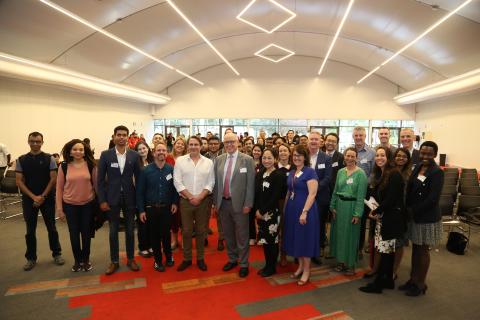
My Legal Mate launch, Macquarie University, 2019 (Image courtesy Macquarie University).
2018 - Safe and Sound campaign launched
Safe and Sound is an education and advocacy campaign seeking to prevent the overuse of harmful and traumatic police strip searches in NSW. Launching in 2018 with a website and social media campaign, followed by the release of award-winning research commissioned by RLC and written by academics at UNSW Law, the campaign created a platform for young people to share their stories about unlawful strip searches.

Strip search community information session with RLC's CEO, Joanna Shulman,
RLC's police accountability solicitor, Sam Lee, Shopfront principal solicitor, Jane Sanders,
and Greens MP, David Shoebridge, MLC, May 2019.
In 2019, pressure placed on NSW Police by RLC's campaign led to a series of investigations by the Law Enforcement Conduct Commission (LECC), which saw a number of significant changes to the way NSW Police conduct strip searches. In 2020, RLC commenced work with class action experts Slater and Gordon to investigate potential class actions against NSW Police, to seek significant damages for people who have been unlawfully searched.
In 2022, a class action was filed by RLC and Slater and Gordon against the state of NSW for strip searches at festivals across NSW.
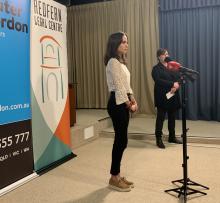
A festival attendee at the launch of RLC's class actions investigation, May 2020.
RLC continues its commitment to providing legal services to communities experiencing vulnerability, seeking reform of the law to achieve systemic change, and to breaking down barriers to accessing justice through the legal system.
To support us in our fight for justice, please donate: https://www.givenow.com.au/redfernlegalcentreappeal